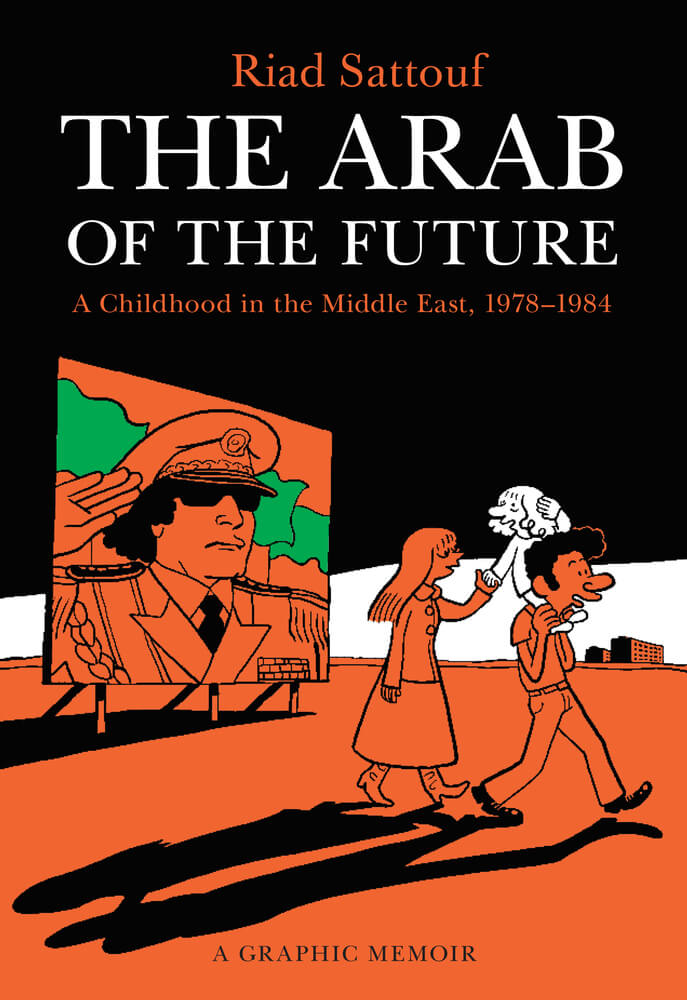
The Arab of the Future: A Childhood in the Middle East, 1978-1984 by Riad Sattouf, Metropolitan Books
At this fraught moment in history, a cartoonist named Riad Sattouf has achieved best-seller status in France with a memoir in the form of a comic book with the provocative title, “The Arab of the Future: A Childhood in the Middle East, 1978-1984.” The first volume of the trilogy, translated by Sam Taylor, is now being published for the first time in the United States by Metropolitan Books. The book, which has been compared to such cartooned memoirs as “Maus” and “Persepolis,” is smart, funny and endearing, if ultimately heartbreaking. Above all, however, the book offers a remarkable opportunity to glimpse the experiences of one Arab childhood through the eyes of a gifted writer and artist.
Sattouf was born to a Syrian father and a French mother, which may account for what he describes as his “long, thick, silky, platinum-blond hair” in early childhood. With a degree in history from the Sorbonne, Sattouf’s father accepts a teaching position in Libya under Moammar Gadhafi, and then in Syria under Hafez al-Assad, which compels young Sattouf to grow up in a kind of netherworld, neither fully Arab nor fully French, and always aware that he is an outsider in both places.
For a memoir set amid the squalor and horror of our troubled times, “The Arab of the Future” is filled with ironic humor. Sattouf recalls his early childhood, when Gadhafi’s displays of grandiosity and self-importance on Libyan state television struck a chord with the attractive toddler who was accustomed to being doted on by his parents and admiring strangers: “He reminded me of me,” Sattouf recalls. “Like me, he had lots of people admiring him and smiling at him all the time.” And a theological debate between his parents ends with a punchline that will be baffling to readers of this review, but not to readers of the book, where it turns into a running joke: “I didn’t understand the word God,” he explains. “But from that day on, whenever I heard it, I would see the face of [French singer] Georges Brassens.”
Significantly, Sattouf is always aware of his mix of origins and never fully comfortable with either one. When the family arrives in Syria, his young cousins are confused by his blond locks and denounce him as “Yahudi” — Jew — and set upon him with fists. “It was the first word I learned in Syria,” he recalls. But he is surprised to find that he is ready to fight back: “I was drawn, propelled toward the violence.” When he hears the call to prayer at 4 the next morning, he reveals the impression it made on him in an aside next to a dialogue bubble: “The saddest voice in the world.”
Sattouf quickly notices that photographs and statues of Assad are just as ubiquitous in Syria as those of Gadhafi had been in Libya, but with one difference. “He wasn’t as handsome or sporty,” Sattouf recalls. “He had a large forehead, and there was something shifty-looking about him.” Yet everyone seemed to mimic his mustachioed face: “With his mustache, even the bus driver looked like Assad,” he writes. “In fact, every man on the bus had a mustache, except for my father.” And when his father puts a bucket over Sattouf’s head during a rainstorm, it is not to protect him from the rain, but from the sight of two corpses hanging from a scaffold as a warning to the populace about breaking the law.
Hatred of Israel is a fact of life for young Sattouf in Syria. Plastic toy soldiers come in two varieties, the Syrians “all frozen in brave, heroic postures” and the Israelis “shaped in deceitful, treacherous poses.” One of the Chinese-made figures is of a dead soldier impaled with an Israeli flag. As the new boy in the neighborhood, he was told: “All right, so you get the Jews.” At the end of the game, an Israeli toy soldier is beheaded with a kitchen knife. “Victory is ours,” his playmate declares. “God is great!” When the boy’s mother scolds him for vandalizing his toys, he protests: “I was cutting off a Jew’s head! I’m allowed to do that!”
The central figure in young Sattouf’s life — and in his book — is his father, a self-proclaimed atheist who is fearful of ghosts and genies and reads to his son from the Quran. He dreams of gold, and he fancies that he will find it among the Roman ruins in Syria. After Sattouf’s father discovers that his own brother has sold off the land in Syria that was his legacy, he persists in vowing to build a “luxury palace” of his own. When he insists that Alawites sell their children as slaves to the Sunnis, he looks at his young son and asks: “Can you just imagine? What if I sold you in exchange for a Mercedes?” Back in France, he discourses on why the Arab world needs the discipline of dictators. “One day, I’ll stage a coup d’etat,” he cracks, “and I’ll have everyone killed. Hee hee.”
As the book ends, Sattouf finds himself on the verge of the family’s return to Syria. By then, we are so fully engaged with this charming young boy that our hearts sink along with his. Two more volumes in the series will reveal what happens next, and it’s a measure of Sattouf’s gifts as a storyteller that I found myself longing to find out.
No comments:
Post a Comment